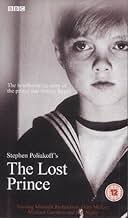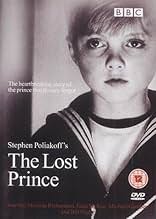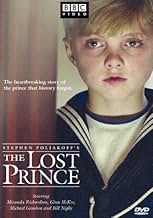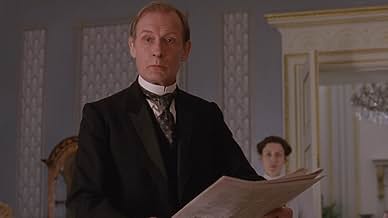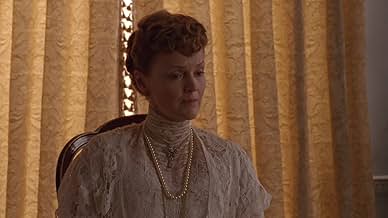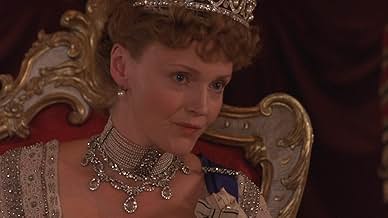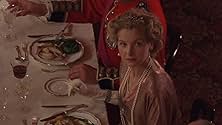IMDb RATING
7.6/10
2.2K
YOUR RATING
The story of Prince John, the autistic and epileptic youngest son of Queen Mary and King George V, who spent his whole life hidden away from public view and died at the age of 13 in 1919.The story of Prince John, the autistic and epileptic youngest son of Queen Mary and King George V, who spent his whole life hidden away from public view and died at the age of 13 in 1919.The story of Prince John, the autistic and epileptic youngest son of Queen Mary and King George V, who spent his whole life hidden away from public view and died at the age of 13 in 1919.
- Won 3 Primetime Emmys
- 8 wins & 21 nominations total
Browse episodes
Featured reviews
10kos5
The Lost Prince is one of those wonderful pieces that you rarely see. Beautiful, touching, moving, and heartbreaking are only a few words to describe it. It was informative also because I had never before known of the epileptic Prince John. I fell in love with Johnny the first time I saw him.
The acting was fantastic. I loved Lalla. Gina Mckee did an excellent job in portraying her. Miranda Richardson(Queen Mary) also did a wonderful bit of acting as the seemingly heartless Queen. I was reduced to tears at the end.
If you've never heard of the wonderful little Prince, or you'd just like to watch a different perspective on the Royal family, see the The Lost Prince, you'll be glad you did.
The acting was fantastic. I loved Lalla. Gina Mckee did an excellent job in portraying her. Miranda Richardson(Queen Mary) also did a wonderful bit of acting as the seemingly heartless Queen. I was reduced to tears at the end.
If you've never heard of the wonderful little Prince, or you'd just like to watch a different perspective on the Royal family, see the The Lost Prince, you'll be glad you did.
10Alex-372
The Lost Prince is a beautiful costume drama from Stephen Poliakoff, about the young brother of prince George, who nobody wanted to talk about and who was most likely autistic and most definitely epileptic, diseases respectively unknown and misunderstood at the time.
This story is roughly told through his eyes, and describes in beautiful detail the transition of Europe from a continent ruled by related monarchs (many of them Saxe-Coburg and Gotha), until the end of this system during and after WWI. As important historical events manage to find their way into palace life (the suffragette movement, the rise of ordinary people as politicians, the telephone and the motor car), they more often seem like foreign intrusions into the world of the palace.
As this is seen through the eyes of the little boy, there is very little value judgement as to whether this system was a right or just one, and at the end you are struck with the horror of the murder of the tsarist family and their beautiful daughters, but we never see the reign of terror they themselves and their secret police visited upon Russia.
There is a very funny incident when the tsarina during a visit to what she sees as her poor cousins estates, refuses to walk any further, because she has the "wrong shoes" for walking in the grass. Later, she remarks how "close" the houses of "other people" are and you can't help conclude she was simply afraid of being killed by the proletariat. :-)
Very well acted by Miranda Richardson (Blackadder), Michael Gambon, Tom Hollander, Gina McKee as the governess Lalla but especially by the two child actors who play Johnny. They look like great kids rather than brats.
Highly recommended if you can catch this on the BBC or HBO.
This story is roughly told through his eyes, and describes in beautiful detail the transition of Europe from a continent ruled by related monarchs (many of them Saxe-Coburg and Gotha), until the end of this system during and after WWI. As important historical events manage to find their way into palace life (the suffragette movement, the rise of ordinary people as politicians, the telephone and the motor car), they more often seem like foreign intrusions into the world of the palace.
As this is seen through the eyes of the little boy, there is very little value judgement as to whether this system was a right or just one, and at the end you are struck with the horror of the murder of the tsarist family and their beautiful daughters, but we never see the reign of terror they themselves and their secret police visited upon Russia.
There is a very funny incident when the tsarina during a visit to what she sees as her poor cousins estates, refuses to walk any further, because she has the "wrong shoes" for walking in the grass. Later, she remarks how "close" the houses of "other people" are and you can't help conclude she was simply afraid of being killed by the proletariat. :-)
Very well acted by Miranda Richardson (Blackadder), Michael Gambon, Tom Hollander, Gina McKee as the governess Lalla but especially by the two child actors who play Johnny. They look like great kids rather than brats.
Highly recommended if you can catch this on the BBC or HBO.
(Aired over two nights this week on the Canadian station, CBUT, which we get here in Seattle...)
Superbly photographed and exquisitely acted, this movie primarily focuses on England's Prince John, youngest son of George V and Queen Mary who, in his tragically short life, suffered not only from periodic epileptic seizures but was also handicapped by what appeared to be some form of retarded mental development.
The creators of this film were kindly and charitable in not showing the boy's ailments in too negative a light. Enough was shown though to give the viewer to understand that the poor lad had problems - so much so that his immediate family and caretakers felt that he clearly wasn't cut out for royal service. As a result he was whisked away to a sort of royal "nether-world" out in the English countryside, away from public view, where hopefully he would not become an object of curiosity, scorn, ridicule, etc.
Sad though the plight of the boy was, you couldn't help but feel that he and his dysfunctional condition was a metaphor for the plight of the entire royal or aristocratic system which held sway over most all of Europe at the time. The boy's ailments and weaknesses eventually lead to his downfall, and all of this plays out simultaneously with the royal families of Europe (most of whom are shown being connected through marriage or bloodline) attempting to cope quite ineffectually with the onslaught of the tragedy of World War One.
The film includes several scenes of interaction between the British royal family and the Russian royal family (the Czar and Czarina and their wonderful kids). They are closely related, which makes their death (or shall we say murder, at the hands of the Bolsheviks, which is graphically depicted) all the more chilling, tragic and thought provoking.
There is so much to contemplate in this movie that I'd rather not sit here and prattle on about it, but instead would rather simply recommend that people go rent a copy and just watch it. It may not be for everyone, as it is a bit long and covers many facets of early 20th century history that will glide right over your head if you weren't paying attention in history class. But even if you ignore entirely the historical aspects of the movie, it is nonetheless a very touching picture: sad, compelling, and ultimately life-affirming, with wonderful performances and beautifully photographed images that will stick in your mind for a long time to come.
Superbly photographed and exquisitely acted, this movie primarily focuses on England's Prince John, youngest son of George V and Queen Mary who, in his tragically short life, suffered not only from periodic epileptic seizures but was also handicapped by what appeared to be some form of retarded mental development.
The creators of this film were kindly and charitable in not showing the boy's ailments in too negative a light. Enough was shown though to give the viewer to understand that the poor lad had problems - so much so that his immediate family and caretakers felt that he clearly wasn't cut out for royal service. As a result he was whisked away to a sort of royal "nether-world" out in the English countryside, away from public view, where hopefully he would not become an object of curiosity, scorn, ridicule, etc.
Sad though the plight of the boy was, you couldn't help but feel that he and his dysfunctional condition was a metaphor for the plight of the entire royal or aristocratic system which held sway over most all of Europe at the time. The boy's ailments and weaknesses eventually lead to his downfall, and all of this plays out simultaneously with the royal families of Europe (most of whom are shown being connected through marriage or bloodline) attempting to cope quite ineffectually with the onslaught of the tragedy of World War One.
The film includes several scenes of interaction between the British royal family and the Russian royal family (the Czar and Czarina and their wonderful kids). They are closely related, which makes their death (or shall we say murder, at the hands of the Bolsheviks, which is graphically depicted) all the more chilling, tragic and thought provoking.
There is so much to contemplate in this movie that I'd rather not sit here and prattle on about it, but instead would rather simply recommend that people go rent a copy and just watch it. It may not be for everyone, as it is a bit long and covers many facets of early 20th century history that will glide right over your head if you weren't paying attention in history class. But even if you ignore entirely the historical aspects of the movie, it is nonetheless a very touching picture: sad, compelling, and ultimately life-affirming, with wonderful performances and beautifully photographed images that will stick in your mind for a long time to come.
This lavish production, uses the vehicle of the short life "The Lost (from history) Prince" to portray what Royal Life was like at the turn of century. The sumptuous production illustrates the splendour, luxury, misery and ultimately the futility of the Royals. There are wonderful images of the beautiful daughters of the tsar. Epileptic Prince John is however seen as the only one as being allowed to be himself. Wonderful performances of the roles of the ice queen Queen Mary, Lalla the nursemaid, Prince John young and old.Has been criticised for being too long, but you must try and get to see this when it comes to your country.
Historical facts, Prince John died aged 14 isolated from his family in a farmhouse at Sandringham? cared for by Lalla Bill. Only one historical reference to him still existed. The height of George V is still a secret.
Historical facts, Prince John died aged 14 isolated from his family in a farmhouse at Sandringham? cared for by Lalla Bill. Only one historical reference to him still existed. The height of George V is still a secret.
Prince John, youngest son of George V and Queen Mary, was handicapped by learning difficulties and the epilepsy which eventually killed him at 14. He spent most of his life hidden away on the Sandringham estate, but he was well cared for and not entirely forgotten by his family (he appeared with his brothers and sisters on a Newfoundland stamp issue). Stephen Poliakof has taken this sad story and created a wonderful tale of growing up in a royal family who, far from ruling their roost, were hidebound by convention, slaves to 'appearances' and emotionally crippled. John, however, is virtually free from all of this as his brother George remarks 'he is the happiest of us all' (or words to that effect).
John and George (later the Duke of Kent) are able to observe some notable historic personalities and moments. When their grandfather Edward VII (Michael Gambon) dies, most of Europe's royalty turn up to the funeral. George, on chatting terms with Lord Stamfordham (Bill Nighy), his father's private secretary, follows the diplomatic descent into World War I. And there is the fate of cousin Nicky, Tsar of Russia, and his family, at the hands of the Bolsheviks. We see these events from the child's viewpoint, or rather from the viewpoints of two rather different, though close, children. This gives a sort of dreamy immediacy to the story, unadorned with explanations.
While his mother Queen Mary (Miranda Richardson) is both physically and emotionally distant, John is given plenty of love and affection by his nurse Lalla (Gina McKee). Despite his disabilities he thrives under her care to an extent his parents find overwhelming.
It's hard to tell how much of the story is based on fact and how much on Poliakoff's imagination, but it scarcely matters. He has created a story which actually evokes sympathy for royalty, a major achievement in this republican age. Prince John, the royal refusenik, leading his band of retainers across the landscape, is an evocative sight.
The settings are gorgeous, though none of the real places (Sandringham, Buckingham palace) is used. The acting is all first-rate; Tom Hollander's earnest George V and Miranda Richardson's stern but not totally unfeeling Queen Mary stand out, along with the boys playing the two princes.
John and George (later the Duke of Kent) are able to observe some notable historic personalities and moments. When their grandfather Edward VII (Michael Gambon) dies, most of Europe's royalty turn up to the funeral. George, on chatting terms with Lord Stamfordham (Bill Nighy), his father's private secretary, follows the diplomatic descent into World War I. And there is the fate of cousin Nicky, Tsar of Russia, and his family, at the hands of the Bolsheviks. We see these events from the child's viewpoint, or rather from the viewpoints of two rather different, though close, children. This gives a sort of dreamy immediacy to the story, unadorned with explanations.
While his mother Queen Mary (Miranda Richardson) is both physically and emotionally distant, John is given plenty of love and affection by his nurse Lalla (Gina McKee). Despite his disabilities he thrives under her care to an extent his parents find overwhelming.
It's hard to tell how much of the story is based on fact and how much on Poliakoff's imagination, but it scarcely matters. He has created a story which actually evokes sympathy for royalty, a major achievement in this republican age. Prince John, the royal refusenik, leading his band of retainers across the landscape, is an evocative sight.
The settings are gorgeous, though none of the real places (Sandringham, Buckingham palace) is used. The acting is all first-rate; Tom Hollander's earnest George V and Miranda Richardson's stern but not totally unfeeling Queen Mary stand out, along with the boys playing the two princes.
Did you know
- TriviaKing George V had six children, two of whom used the name George. His second son was Prince Albert Frederick Arthur George, known to the family as Bertie, who became King George VI. He had a bad stutter that began in early childhood and lasted into adulthood. His third son, Johnnie's closest sibling in this movie, was Prince George, Duke of Kent. He grew up to live a life that was considered scandalous, and died in a plane crash in 1942.
- GoofsWhen the Romanovs are in England, Alexandra speaks English with a Russian accent. In real life, Alexandra was a German princess raised in England by her grandmother, Queen Victoria. She spoke English with a British accent.
- Quotes
Prince George: [Speaking about Prince John] He was the only one of us who was able to be himself.
- ConnectionsFeatured in Masterpiece: The Lost Prince: Part 1 (2004)
- SoundtracksRondo for Glass Armonica
(uncredited)
Composed by Joseph Schmittbauer (as J.A. Schmittbauer)
(Queen Alexandra's birthday cake)
Details
- Release date
- Countries of origin
- Official sites
- Language
- Also known as
- 失落的王子
- Filming locations
- Black Park Country Park, Black Park Road, Wexham, Buckinghamshire, England, UK(Russian lake, royal car)
- Production companies
- See more company credits at IMDbPro
Contribute to this page
Suggest an edit or add missing content

